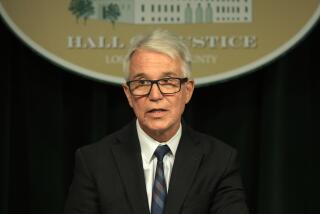Hicks Denies His Policy Has Clogged Court System
- Share via
Dist. Atty. Cecil Hicks Monday defended his policy requiring that plea-bargaining discussions in felony cases be held in open court, saying it has not had any “overwhelming, dramatic effect” on Orange County’s system of justice, despite claims to the contrary.
Last Friday, Orange County’s presiding Superior Court judge, Harmon G. Scoville, said in a letter hand-delivered to county supervisors that Hicks’ policy is flooding the courts with criminal trials and could cost the county more than $6 million this year.
The district attorney said Monday that, if Superior Court judges are having a problem finding courts to hear civil cases, “then they should address that problem.” But he said that problem is not the fault of his office.
“Lawyer’s Trick”
“We are not occupying an inordinate number of courtrooms--we’re just not,” Hicks said. “Now realize that there is a temptation for someone who is trying to say ‘we have a need out here’ to start gnawing on any possible argument they can use. I mean it’s a lawyer’s trick.
“And since (the new plea-bargaining policy) has been viewed by some as a massive change in this office, it is easy to make up a whipping boy. But the facts don’t bear this out.”
Scoville’s letter said Hicks’ policy, implemented last October, and an unrelated increase in lawsuits added up to an “explosion” in court cases and left the county with too few judges and too few courts to “serve the needs” of people involved in non-criminal cases.
Under Hicks’ policy, his deputies are prohibited from participating in plea-bargaining discussions in judges’ chambers. Many defense attorneys have said they cannot discuss their clients’ cases frankly in open court for ethical reasons. As a result, more criminal cases--which have priority over civil cases when courtrooms are scarce--have been scheduled for trial than in the past.
In the next few months, “fairly drastic measures” must be taken to avoid a situation in which private citizens involved in non-criminal cases are shut out of the court system, Scoville said in his letter.
The judge said the plea-bargaining policy means that “additional county costs may conservatively be exceeding $500,000 per month” because of added jurors’ fees, the cost of defense attorneys paid by the county, translators, court reports and other expenses.
Scoville said possible solutions to the situation included night court sessions, new courtrooms, leased space for more courts and hiring more lawyers to serve as court commissioners.
The judge said that, in the first nine months of 1986, an average of 16 courts were used for criminal matters on any given day. For the last three months of the year, after Hicks’ policy was implemented, an average of 21 or 22 courts were used--and once the number given over to criminal cases reached 30.
Doubts Figure
Hicks said he had not read Scoville’s letter but had talked to a member of the district attorney’s staff who had. The district attorney expressed doubt about the $500,000-a-month figure but said additional outlays would not be the fault of his office.
“I will not comment on whatever civil problems they have in the civil court, but I will say we are not responsible for them,” he said.
He said that on Monday 10 courts were being used for criminal cases. Another three were vacant because one judge had retired, another was on vacation and a third was attending a judicial conference.
“Now if the Superior Court is having a problem with a civil backlog, then they should address that problem, but it has nothing to do with us, as these figures clearly show,” Hicks said.
Hicks said that, while “a few extra cases” may have gone to trial rather than ending in plea bargains since October, his policy “is not going to have any overwhelming, dramatic effect” on the court system. “It has not and I’m convinced it will not.”
Comment From Wieder
Scoville said in his letter that the board of supervisors last year expressed support for increasing the number of Superior Court judges in the county from 64 to 70, but the Legislature failed to approve the plan. He said he now believes 15 to 20 new judges are needed.
Most county supervisors said Monday that they either had not seen Scoville’s letter or wanted to study it further before commenting.
But Supervisor Harriett Wieder praised both Scoville and Hicks, saying their actions had put the problem of limited court resources “into focus.”
She said she wanted a county study to come up with “a management approach of how do we better use our resources. We can’t throw money at (the problem). We will never have enough money. The question is, ‘Are we using our resources to the fullest?’ ”
More to Read
Sign up for Essential California
The most important California stories and recommendations in your inbox every morning.
You may occasionally receive promotional content from the Los Angeles Times.










